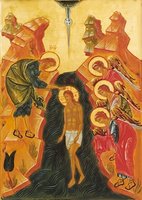The Cross of Christ Teaches Us. . . How to Pray
And in praying do not heap up empty phrases as the Gentiles do; for they think that they will be heard for their many words. Do not be like them, for your Father knows what you need before you ask him. MATTHEW 6:7–8
Praying as a Follower of Christ
Throughout the centuries, Christians in the East and the West have signed themselves with the cross. When it is done with little thought or care, the sign loses much of its power. Contemplating both the action and what it symbolizes as you make the sign, on the other hand, is the perfect way to begin any conversation with God.
As you make the sign of the cross, you place your entire being in the shadow of the cross of Christ. By invoking the Trinity as you make this holy sign, you immediately call to mind that facing the cross is something we dare not do alone, but only in God’s presence. Every moment, we must choose between the way of the cross of Christ and the way of perdition. Every minute, the battle for our salvation is being lost or won.
--an excerpt from The Power of the Cross by Michael Dubruiel is a book well-suited to daily reading during Lent.


